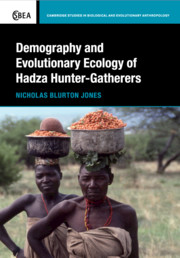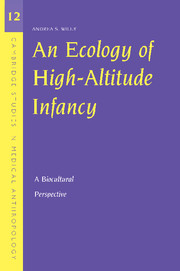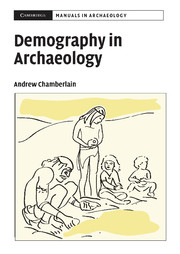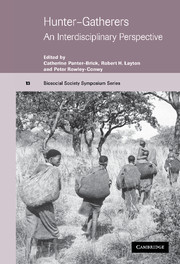Demography and Evolutionary Ecology of Hadza Hunter-Gatherers
£43.99
Part of Cambridge Studies in Biological and Evolutionary Anthropology
- Author: Nicholas Blurton Jones, University of California, Los Angeles
- Date Published: June 2020
- availability: Available
- format: Paperback
- isbn: 9781107657052
£
43.99
Paperback
Other available formats:
Hardback, eBook
Looking for an inspection copy?
This title is not currently available on inspection
-
The Hadza, an ethnic group indigenous to northern Tanzania, are one of the few remaining hunter-gatherer populations. Archaeology shows 130,000 years of hunting and gathering in their land but Hadza are rapidly losing areas vital to their way of life. This book offers a unique opportunity to capture a disappearing lifestyle. Blurton Jones interweaves data from ecology, demography and evolutionary ecology to present a comprehensive analysis of the Hadza foragers. Discussion centres on expansion of the adaptationist perspective beyond topics customarily studied in human behavioural ecology, to interpret a wider range of anthropological concepts. Analysing behavioural aspects, with a specific focus on relationships and their wider impact on the population, this book reports the demographic consequences of different patterns of marriage and the availability of helpers such as husbands, children, and grandmothers. Essential for researchers and graduate students alike, this book will challenge preconceptions of human sociobiology.
Read more- Provides a lasting account of one of the few remaining hunter-gatherer tribes in existence
- Comprehensive analysis of the Hadza people based on extensive research carried out by Blurton Jones over the last thirty years
- Supplementary information published online that will enable both researchers and graduates to access further resources on the Hadza
Customer reviews
17th Oct 2024 by UName-720964
thanks for a good and very informative book. research oriented work. thanks for giving us a good book like this.
Review was not posted due to profanity
×Product details
- Date Published: June 2020
- format: Paperback
- isbn: 9781107657052
- length: 510 pages
- dimensions: 245 x 170 x 30 mm
- weight: 0.9kg
- contains: 135 b/w illus. 39 tables
- availability: Available
Table of Contents
Preface and acknowledgements
Part I. Demography:
1. Introduction
2. Geography and ecology in the Eyasi basin
3. History of the Hadza and the Eyasi basin
4. Research strategy and methods
5. Migration and intermarriage. Are eastern Hadza a population?
6. Hadza regions. Do they contain sub-populations?
7. Fertility
8. Mortality
9. Testing the estimates of fertility and mortality
10. Hadza demography. A normal human demography sustained by hunting and gathering in sub-Saharan savanna
11. The Hadza and hunter-gatherer population dynamics
Part II. Applying the Demographic Data to Hadza Behavior and Biology:
12. Introduction to part two
13. The outcome variables: fertility, child survival, and reproductive success
14. Men and women's reputations as hunters, traders, arrow makers, and diggers
15. Marriage
16. Another dependent variable. Growth as a proxy for fitness
17. Inter-birth intervals
18. Grandmothers as helpers
19. Grandmothers and competition between the generations
20. Children as helpers
21. Husbands and fathers as helpers
22. Variation among hunter-gatherers. Evolutionary economics of monogamy, male competition, and the sharing ethic
References
Index.-
General Resources
Find resources associated with this title
Type Name Unlocked * Format Size Showing of
This title is supported by one or more locked resources. Access to locked resources is granted exclusively by Cambridge University Press to lecturers whose faculty status has been verified. To gain access to locked resources, lecturers should sign in to or register for a Cambridge user account.
Please use locked resources responsibly and exercise your professional discretion when choosing how you share these materials with your students. Other lecturers may wish to use locked resources for assessment purposes and their usefulness is undermined when the source files (for example, solution manuals or test banks) are shared online or via social networks.
Supplementary resources are subject to copyright. Lecturers are permitted to view, print or download these resources for use in their teaching, but may not change them or use them for commercial gain.
If you are having problems accessing these resources please contact [email protected].
Sorry, this resource is locked
Please register or sign in to request access. If you are having problems accessing these resources please email [email protected]
Register Sign in» Proceed
You are now leaving the Cambridge University Press website. Your eBook purchase and download will be completed by our partner www.ebooks.com. Please see the permission section of the www.ebooks.com catalogue page for details of the print & copy limits on our eBooks.
Continue ×Are you sure you want to delete your account?
This cannot be undone.
Thank you for your feedback which will help us improve our service.
If you requested a response, we will make sure to get back to you shortly.
×







